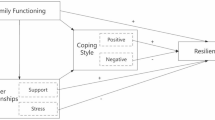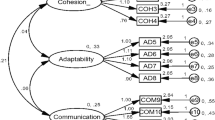Abstract
Objectives
Early physical and mental experiences from family of origin and parents might influence individuals’ later adulthood quality of life (QOL). The present study was undertaken to examine the inter-relationships among function of family of origin, resilience, and current quality of life in a T2DM sample from China.
Methods
Three hundred T2DM participants were included in this investigation. A Chinese version of Connor-Davidson Resilience Scale 25, an APGAR family functioning scale, and a Diabetes Specificity Quality of Life Scale were used to assess the levels of mental resilience, function of family of origin, and QOL of these patients, respectively. Multiple stepwise regression analysis was performed to identify the predictors of QOL. A 3-step composite analysis was used to examine the predicted mediating effect.
Results
QOL total score was negatively related to resilience (r = − .299, p < 0.01) and family function (r = − .246, p < 0.01). In contrast, a significantly positive correlation between resilience and family function (r = .302, p < 0.01) was found. Two subscales of resilience (strength and optimism) and function of family of origin explained an additional 4.5% of the variance in QOL changes after controlling for demographic variables. Resilience had a 26.3% mediating effect between function of family of origin and current QOL.
Conclusion
In conclusion, the present work suggested a synthetic and stable association between function of family of origin and QOL level in the later life in a sample of Chinese T2DM population, with resilience acting as a mediating factor. Adult individuals who have grown up in an unfavorable family setting may be low in mental resilience, and would have worse QOL in their mid- and later life, especially when they are confronted with certain adversity or stress, such as having diabetes.

Similar content being viewed by others
References
Hu L, Huang X, You C, Li J, Hong K, Li P, et al. Prevalence of overweight, obesity, abdominal obesity and obesity-related risk factors in southern China. PLoS One. 2017;12(9):e0183934.
Fang EF, Scheibye-Knudsen M, Jahn HJ, Li J, Ling L, Guo H, et al. A research agenda for aging in China in the 21st century. Ageing Res Rev. 2015;24(Pt B):197–205.
Dai H, Jia G, Liu K. Health-related quality of life and related factors among elderly people in Jinzhou, China: a cross-sectional study. Public Health. 2015;129(6):667–73.
Zheng Y, Ley SH, Hu FB. Global aetiology and epidemiology of type 2 diabetes mellitus and its complications. Nat Rev Endocrinol. 2018;14(2):88–98.
Zhu S, Hu J, McCoy TP, Li G, Zhu J, Lei M, et al. Socioeconomic status and the prevalence of type 2 diabetes among adults in northwest China. Diabetes Educ. 2015;41(5):599–608.
Ma RCW. Epidemiology of diabetes and diabetic complications in China. Diabetologia. 2018;61(6):1249–60.
Al Hayek AA, Robert AA, Al Saeed A, Alzaid AA, Al Sabaan FS. Factors associated with health-related quality of life among Saudi patients with type 2 diabetes mellitus: a cross-sectional survey. Diabetes Metab J. 2014;38(3):220–9.
Derakhshanpour F, Vakili MA, Farsinia M, Mirkarimi K. Depression and quality of life in patients with type 2 diabetes. Iran Red Crescent Med J. 2015;17(5):e27676.
Sepulveda E, Poinhos R, Constante M, Pais-Ribeiro J, Freitas P, Carvalho D. Health-related quality of life in type 1 and type 2 diabetic patients in a Portuguese central public hospital. Diabetes Metab Syndr Obes. 2015;8:219–26.
Treyvaud K. Parent and family outcomes following very preterm or very low birth weight birth: a review. Semin Fetal Neonatal Med. 2014;19(2):131–5.
Rothrauff TC, Cooney TM, An JS. Remembered parenting styles and adjustment in middle and late adulthood. J Gerontol Ser B Psychol Sci Soc Sci. 2009;64(1):137–46.
Andersson L, Stevens N. Associations between early experiences with parents and well-being in old age. J Gerontol. 1993;48(3):P109–16.
Zhong X, Wu D, Nie X, Xia J, Li M, Lei F, et al. Parenting style, resilience, and mental health of community-dwelling elderly adults in China. BMC Geriatr. 2016;16:135.
Bennett JA. Mediator and moderator variables in nursing research: conceptual and statistical differences. Res Nurs Health. 2000;23(5):415–20.
Zhang H, Zhao Q, Cao P, Ren G. Resilience and quality of life: exploring the mediator role of social support in patients with breast cancer. Med Sci Monitor. 2017;23:5969–79.
Xu J, Ou L. Resilience and quality of life among Wenchuan earthquake survivors: the mediating role of social support. Public Health. 2014;128(5):430–7.
Rao D, Chen WT, Pearson CR, Simoni JM, Fredriksen-Goldsen K, Nelson K, et al. Social support mediates the relationship between HIV stigma and depression/quality of life among people living with HIV in Beijing, China. Int J STD AIDS. 2012;23(7):481–4.
Bennich BB, Munch L, Egerod I, Konradsen H, Ladelund S, Knop FK, et al. Patient assessment of family function, glycemic control and quality of life in adult patients with type 2 diabetes and incipient complications. Can J Diabetes. 2019;43(3):193–200.
Wang J, He M, Zhao X. Depressive symptoms, family functioning and quality of life in Chinese patients with type 2 diabetes. Can J Diabetes. 2015;39(6):507–12.
Alves Costa MS, Pereira MG. Predictors and moderators of quality of life in caregivers of amputee patients by type 2 diabetes. 2018;32(2):933–42.
Tol A, Sharifirad G, Eslami A, Shojaeizadeh D, Alhani F, Tehrani MM. Analysis of some predictive factors of quality of life among type 2 diabetic patients. J Educ Health Promot. 2015;4:9.
Zinszer KM, Mulhern JL, Kareem AA. The implementation of the chronic care model with respect to dealing with the biopsychosocial aspects of the chronic disease of diabetes. Adv Skin Wound Care. 2011;24(10):475–84.
Camacho F, Anderson RT, Bell RA, Goff DC Jr, Duren-Winfield V, Doss DD, et al. Investigating correlates of health related quality of life in a low-income sample of patients with diabetes. Qual Life Res Int J Qual Life Asp Treat Care Rehab. 2002;11(8):783–96.
Song Y, Nam S, Park S, Shin IS, Ku BJ. The impact of social support on self-care of patients with diabetes: what is the effect of diabetes type? Systematic review and meta-analysis. Diabetes Educ. 2017;43(4):396–412.
Golicki D, Dudzinska M, Zwolak A, Tarach JS. Quality of life in patients with type 2 diabetes in Poland - comparison with the general population using the EQ-5D questionnaire. Adv Clin Exp Med. 2015;24(1):139–46.
Oguntibeju OO, Odunaiya N, Oladipo B, Truter EJ. Health behaviour and quality of life of patients with type 2 diabetes attending selected hospitals in south western Nigeria. West Indian Med J. 2012;61(6):619–26.
Jing X, Chen J, Dong Y, Han D, Zhao H, Wang X, et al. Related factors of quality of life of type 2 diabetes patients: a systematic review and meta-analysis. Health Qual Life Outcomes. 2018;16(1):189.
Smith GD, Ng F. Ho Cheung Li W. COVID-19: emerging compassion, courage and resilience in the face of misinformation and adversity. J Clin Nurs. 2020;29(9–10):1425–8.
Izydorczyk B, Kwapniewska A, Lizinczyk S, Sitnik-Warchulska K. Psychological resilience as a protective factor for the body image in post-mastectomy women with breast cancer. Int J Environ Res Public Health. 2018;15(6).
Nawaz A, Malik JA, Batool A. Relationship between resilience and quality of life in diabetics. J College Phys Surg--Pakistan: JCPSP. 2014;24(9):670–5.
Kirby JS, Butt M, Esmann S, Jemec GBE. Association of resilience with depression and health-related quality of life for patients with hidradenitis suppurativa. JAMA Dermatol. 2017;153(12):1263–9.
Kasser SL, Zia A. Mediating role of resilience on quality of life in individuals with multiple sclerosis: a structural equation modeling approach. Arch Phys Med Rehabil. 2020;101:1152–61.
Amstadter AB, Maes HH, Sheerin CM, Myers JM, Kendler KS. The relationship between genetic and environmental influences on resilience and on common internalizing and externalizing psychiatric disorders. Soc Psychiatry Psychiatr Epidemiol. 2016;51(5):669–78.
Lu C, Yuan L, Lin W, Zhou Y, Pan S. Depression and resilience mediates the effect of family function on quality of life of the elderly. Arch Gerontol Geriatr. 2017;71:34–42.
Bahremand M, Rai A, Alikhani M, Mohammadi S, Shahebrahimi K, Janjani P. Relationship between family functioning and mental health considering the mediating role of resiliency in type 2 diabetes mellitus patients. Global J Health Sci. 2014;7(3):254–9.
Wang RH, Lin KC, Hsu HC, Lee YJ, Shin SJ. Determinants for quality of life trajectory patterns in patients with type 2 diabetes. Qual Life Res Int J Qual Life Asp Treat Care Rehab. 2019;28(2):481–90.
Zhai Y, Liu K, Zhang L, Gao H, Chen Z, Du S, et al. The relationship between post-traumatic symptoms, parenting style, and resilience among adolescents in Liaoning, China: a cross-sectional study. PloS one. 2015;10(10):e0141102.
Chen P, Harris KM. Association of positive family relationships with mental health trajectories from adolescence to midlife. JAMA Pediatr. 2019:e193336.
Heerde JA, Bailey JA, Toumbourou JW, Catalano RF. Longitudinal associations between the adolescent family environment and young adult substance use in Australia and the United States. Front Psychiatry. 2019;10:821.
Whittle S, Simmons JG, Dennison M, Vijayakumar N, Schwartz O, Yap MB, et al. Positive parenting predicts the development of adolescent brain structure: a longitudinal study. Dev Cogn Neurosci. 2014;8:7–17.
Acknowledgments
The authors would like to thank all the participants in this investigation.
Author information
Authors and Affiliations
Contributions
Hongliang Dai formulated the research questions, designed and supervised the study, developed the preliminary search strategy, and drafted the manuscript; Guizhi Jia, Xin Li, Yuying Chu, and Hongliang Dai collected and analyzed the data for study. Hongliang Dai wrote the manuscript. Guizhi Jia and Yuying Chu conducted the quality assessment. All authors critically reviewed the manuscript for relevant intellectual content. All authors have read and approved the final version of the manuscript.
Corresponding author
Ethics declarations
Conflict of interest
The authors declare that they have no conflict of interest.
Ethical consideration
All the participants were informed beforehand regarding the purpose and process of this study. Afterwards, the written informed consent was obtained from the eligible participants who readily agreed to participate in this research before they completed the questionnaires. They were also informed to have the right to withdraw from this survey if for any reason they were not interested in doing so. All procedures performed in studies involving human participants were in accordance with the 1964 Helsinki declaration and its later amendments or comparable ethical standards. The study protocol was also reviewed and approved by Jinzhou Medical University Ethics Committee.
Additional information
Publisher’s note
Springer Nature remains neutral with regard to jurisdictional claims in published maps and institutional affiliations.
Rights and permissions
About this article
Cite this article
Jia, G., Li, X., Chu, Y. et al. Function of family of origin and current quality of life: exploring the mediator role of resilience in Chinese patients with type 2 diabetes. Int J Diabetes Dev Ctries 41, 346–353 (2021). https://doi.org/10.1007/s13410-020-00894-5
Received:
Accepted:
Published:
Issue Date:
DOI: https://doi.org/10.1007/s13410-020-00894-5




